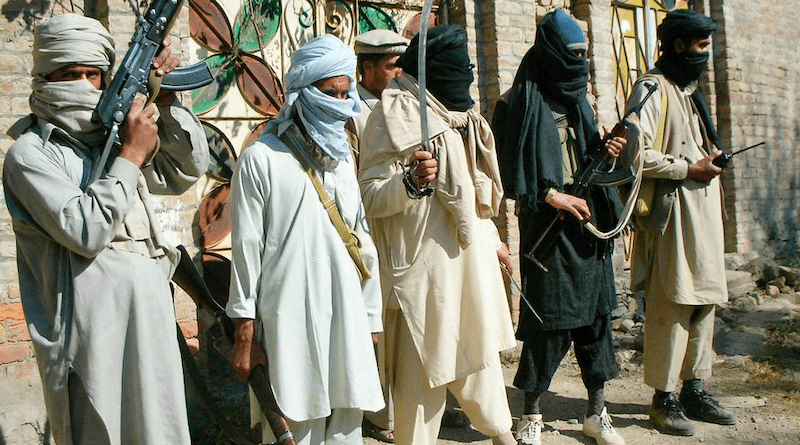Terrorism Spike In Pakistan – OpEd
The parasite of terrorism is again infesting Pakistan. There has been a sharp increase in insurgent attacks across the state with Khyber-Pakhtunkhwa and Baluchistan targeted primarily. The unrest is slowly spreading to other areas as well with a major attack on a police station in Karachi. Tehreek e Taliban Pakistan (TTP) rising hostility to confront Pakistan’s security forces right on their stations depict graveness of upcoming situation.
Fresh waves of attacks by TTP can be attached to three interconnected aspects. These include Afghan Taliban soft attitude towards TTP actions, their members getting hold of modernized weaponry abandoned by NATO forces in Afghanistan and concessions endowed on them. These concessions by Pakistan such as releasing TTP prisoners were considered a vital component of Confidence Building Measures (CBM). Increased material power of TTP is well depicted in its political bonding, broadening scale of trained militants, suicide bombers and armaments. Majority of TTP’s political leadership and strength emanates from Afghanistan. It is re-establishing its foothold in Khyber Pakhtunkhwa Southern areas such as North and South Waziristan, Tank, Banu and Lakki Marwat.
In wake of rising attacks, high level military and civilian leaders have assessed that even the greatest level of security sector reforms cannot put an end to violence unless Afghan Taliban pull in the reins of their Pakistani counterparts. The dilemma lies in making Afghan Taliban comply to Pakistan’s demands which they have been stubbornly refusing to do so.
Patience of Pakistan’s senior leadership with Afghan Taliban over negotiations has been dwindling. Unruly demands by Afghan Taliban such as reversal of FATA’s merger into Khyber Pakhtunkhwa had been a constant put off for Pakistani authorities. Such demands have created friction between the two negotiating sides. In such circumstances, option of using force to teach a lesson to the rogue elements seems as most probable. However, a deeper analysis of the total gains and losses in adopting a hard-line policy is required. The term ‘strategic patience’ is often used at such times to avoid burden of engaging in a protracted militaristic confrontation against the enemy.
For some analysts, launching a full-scale military operation against TTP could be counterproductive. All Jihadi fervour inside Afghanistan will be aimed at Pakistan making things more complicated for Pakistani authorities. According to an analysis by Michael Kugelman, Senior Associate for South Asia at the Wilson Centre, Pakistan’s ability to convince Taliban of its persisting leverage over the group either as a proponent of Taliban regime abroad or as an all-time host of Afghan refugees might advance the negotiations.
Another viable and effective tool which can be utilized by Pakistan is to coordinate with international community particularly our regional partners like China and Russia. Terrorism is like a virus which cannot be curbed through strong boundaries or strong militaries. It spreads like fire and engulfs the most civilized of minds. An unstable Pakistan and Afghanistan will be a disadvantage for entire region. Therefore, collective action on part of all regional states can significantly impede nefarious intentions of TTP.
A pattern observed in majority of attacks by TTP in Pakistan is constant targeting of police force. Around 300 police officers have perished in the new surge of attacks since September,2022 primarily in Khyber Pakhtunkhwa. The police chief made an official statement on 17th February claiming 62 militant attacks taking place in the province yet alone in January. The police force of the province lacks modernized weapons, adequate training enough deployment to tackle TTP. On the other hand, militants have gotten hold of advanced weaponry left behind by NATO forces in Afghanistan. These include innovative weaponry such as rocket-propelled grenades and thermal imaging devices.
Any attempts to curb the TTP is fruitless unless our police force is adequately prepared to fight this menace. Advanced techniques of conducting operations and data analytics in prediction and prevention of crime should be introduced in police department.
It is not that Pakistan has not devised enough policies or introduced comprehensive frameworks to curb the TTP menace. Actual dilemma occurs in converting proposed framework into practical actions which produce the desired outcome. The National Counter Violent Extremism Policy (NCVE) and National Action Plan (NAP) is a comprehensive plan enacted by National Counter Terrorism Authority (NACTA) to stop extremism from infesting Pakistan. Filling the existing gaps in practical application of this policy framework is most vital to achieve success.
Pakistan is a very resilient state time and again being challenged by extremism. Its recorded history exemplifies the dedication and expertise with which the country controlled rising fundamentalism in past. Through taking timely and accurate measures again, the state will be able to pull itself out of this debilitating situation.

